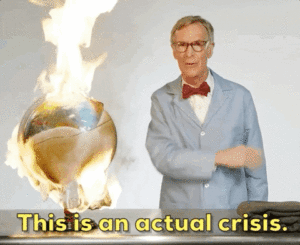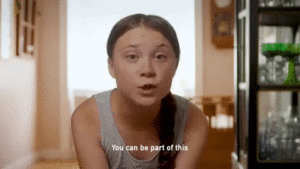Orange Skies, Helpless Panic and Climate Change
On Wednesday, September 9th, I woke up to coral darkness illuminating my room. I assumed the sun began its rise. I thought it strange that I was waking up so early and lazily rolled over in my bed to reach for my phone. The numbers 11 and 30 blinded me. I scrambled to my window to find that an orange filter had taken over my suburban, usually blue-skied California town. A murky, half-asleep panic set over me as I frantically scrolled through news outlets.
The proof of our deteriorating world surrounds me in a disturbing yellow haze as I sit quarantined in my room, writing this article under bright fluorescent lights at one in the afternoon.
2020 brought with it a plethora of realizations and learning opportunities.

However, the effects of climate change act as the most alarming lesson to our world thus far. From the West’s raging fires to the severe flooding in Florida to the whiplash of a temperature change in Colorado, the earth’s cries for help ring loud. The only solution to saving our planet lies in making drastic changes in our lifestyles and government structure.
As merely an undergraduate, I feel helpless in advocating for the environmental change our planet deserves. Raising my tiny voice against capitalist corporations and government greed seems a frivolous effort. However, activists like Ayakha Melithafa and Greta Thunberg ignite hope for our uncertain future. Despite their impressively young age, many college students like me look up to their passion and intelligence in dedicating their lives to advocating for the environment and everything that dwells within it. Although their voices are powerful, they do not seem enough to alter the course of the dwindling world around us, especially this year.
As proven by this terrifying dystopian morning, the awe-inspiring progress these young activists achieve seems inconsequential without students like us to fight in our own ways to assist in saving the planet. The only way to achieve change lies in uniting our voices, not against the enemy, but in defense of a planet that provides so much for us.
Students may feel hopeless while staring at their professors through a screen, watching a strange world through their windows, and reading the news to find anger and hate. Still, it remains up to us to change the tides of the world. Through our voices, votes, and education, students can achieve more than they believe.
Now, this climate change-reversal battle cry may seem overwhelming, but students can easily find small yet impactful ways to be involved in the fight.

I challenge students to spend an hour each week educating and advocating for a change. Do online research about climate change effects -or you can look outside at this point- and develop fact-driven arguments to discuss with family members and friends. Then when you feel informed, start reaching out to powerful companies and government officials. Like the inspiring and consistent fight for Black lives (which should continue just as rigorously), students must also overwhelm the federal and state governments with petitions, emails, and phone calls. Call and email your state representative, write letters to companies who are destroying the ecosystem, and carelessly changing the seasons as we know it.
If millions of students from around the world were to unite and fight with a united voice, we could achieve significant change. My strange morning acts as a reminder of our generation’s obligation to advocate for the planet because right now the future dances on the fine line between environmental destruction and restoration, inequality, and justice.
This burden may seem a lot to bear with the incoming floods of classes and assignments, but days like this prove that the world extends way beyond our academic bubble. Our world clearly has an expiration date and as it nears, we must remind people in power to reconstruct it in a humane, stable, fair, and peaceful manner.
tinyurlis.gdv.gdv.htu.nuclck.ruulvis.netshrtco.de
